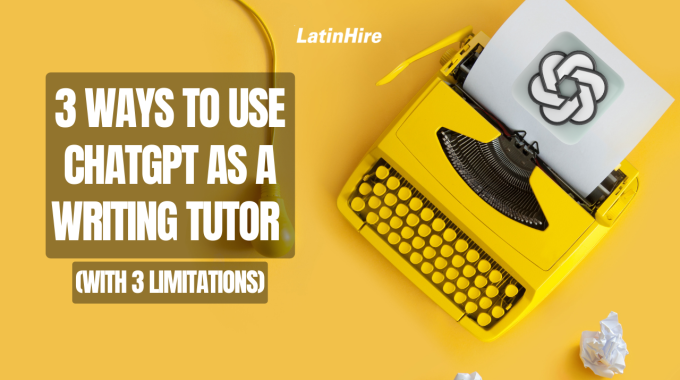Yesterday (March 9, 2025) marked the start of daylight saving time (DST)—a potential headache for…

3 ways to use ChatGPT as a Writing Tutor (with 3 limitations)
Writing is an important skill that allows us to effectively communicate with others. Whether it’s writing an email, a text, an article or an essay, having the ability to express yourself clearly in words is crucial to avoid misunderstandings. Being able to write well allows us to convey our thoughts to others at school, at work and in our relationships.
Writing can be challenging for many people, even for native speakers and particularly for language learners. For this reason, writing tutors are essential in helping students improve their writing skills. In recent years, writing tutors have turned to technology to improve their teaching methods, with the latest technology being ChatGPT.
ChatGPT is an AI intelligence language model that can mimic human-like conversations and has access to a wide array of information to formulate what it considers to be the best response. ChatGPT is the beginning of a new technological era in AI and because the technology is still relatively new, there are some limitations and it cannot be used as a replacement for writing tutors.
It can, however, assist writing tutors with their teaching and here are three ways how:

1) Overcome writer’s block
One way writing tutors can use ChatGPT is to help students overcome writer’s block. Writer’s block is a common problem that many writers face, where they struggle to come up with ideas or express themselves in writing.
Writing tutors can use ChatGPT to generate ideas, suggest writing prompts, or provide writing tips to help students overcome writer’s block. For example, tutors can ask ChatGPT to provide some writing prompts about a certain topic or for a certain grade level.
2) Provide feedback on student writing
Another way writing tutors can use ChatGPT is to provide feedback on students’ writing. ChatGPT can analyze a student’s writing to make corrections and provide suggestions on how to improve it.
For instance, it can point out grammatical errors, provide better word choices, or suggest ways to improve the flow of a sentence or paragraph. ChatGPT may catch errors that the tutors themselves missed, so it can complement a tutor’s feedback for students.
3) Increase efficiency in answering student questions
Students may have many questions during the writing process, so ChatGPT can help writing tutors save time by generating answers quickly. This is ideal for tutors who work with many students at a time.
So if students are asking questions about grammar, sentence structure or word variations, the tutor can quickly get a response from ChatGPT. For example, if students want to find alternative words for “good”, ChatGPT can generate a list of options such as, “excellent, great, superb, splendid, fantastic, awesome”.
Limitations of ChatGPT for Writing Tutors

As great a tool ChatGPT is for writing tutors, it should be noted that ChatGPT has its limitations. ChatGPT’s responses may not always be accurate or appropriate, particularly in the case of complex writing assignments. Therefore, writing tutors should use ChatGPT as a complementary tool to their teaching methods and not as a substitute for their expertise.
Here are three limitations of ChatGPT for Writing Tutors to consider:
1) Lack of personalization
ChatGPT is not able to personalize its feedback to individual learners. It cannot take into account a learner’s specific needs, learning styles, or prior knowledge and experiences, which are all important factors tutors have to consider when teaching writing.
So while ChatGPT is capable of generating new and original feedback, it may not always be able to provide personalized feedback or help learners think outside of the box in their writing.
2) Limited understanding of context
ChatGPT is a language model trained on a large amount of text, but it may not always understand the nuances of specific writing tasks or contexts. It may struggle to provide targeted feedback on writing assignments that require specific knowledge or technical language.
For this reason, writing tutors are better off giving their own personalized feedback on tasks that are unique to the students’ experiences as well as require particular understanding about a subject or background information.
3) Inability to model human thought processes and dialogue
ChatGPT is not capable of simulating the complex cognitive processes involved in writing. This means that it cannot provide the kind of nuanced feedback and guidance that a human writing tutor can.
While ChatGPT is capable of responding to user input, it may not always be able to engage in meaningful dialogue or address follow-up questions like a human. This can limit its effectiveness in providing feedback and support to learners.
Overall, it appears that ChatGPT can be helpful for writing tutors but as with any technology, it should be used with discretion. Would you consider using ChatGPT as a writing tutor? Why or why not? Share your thoughts with us in the comments below!



